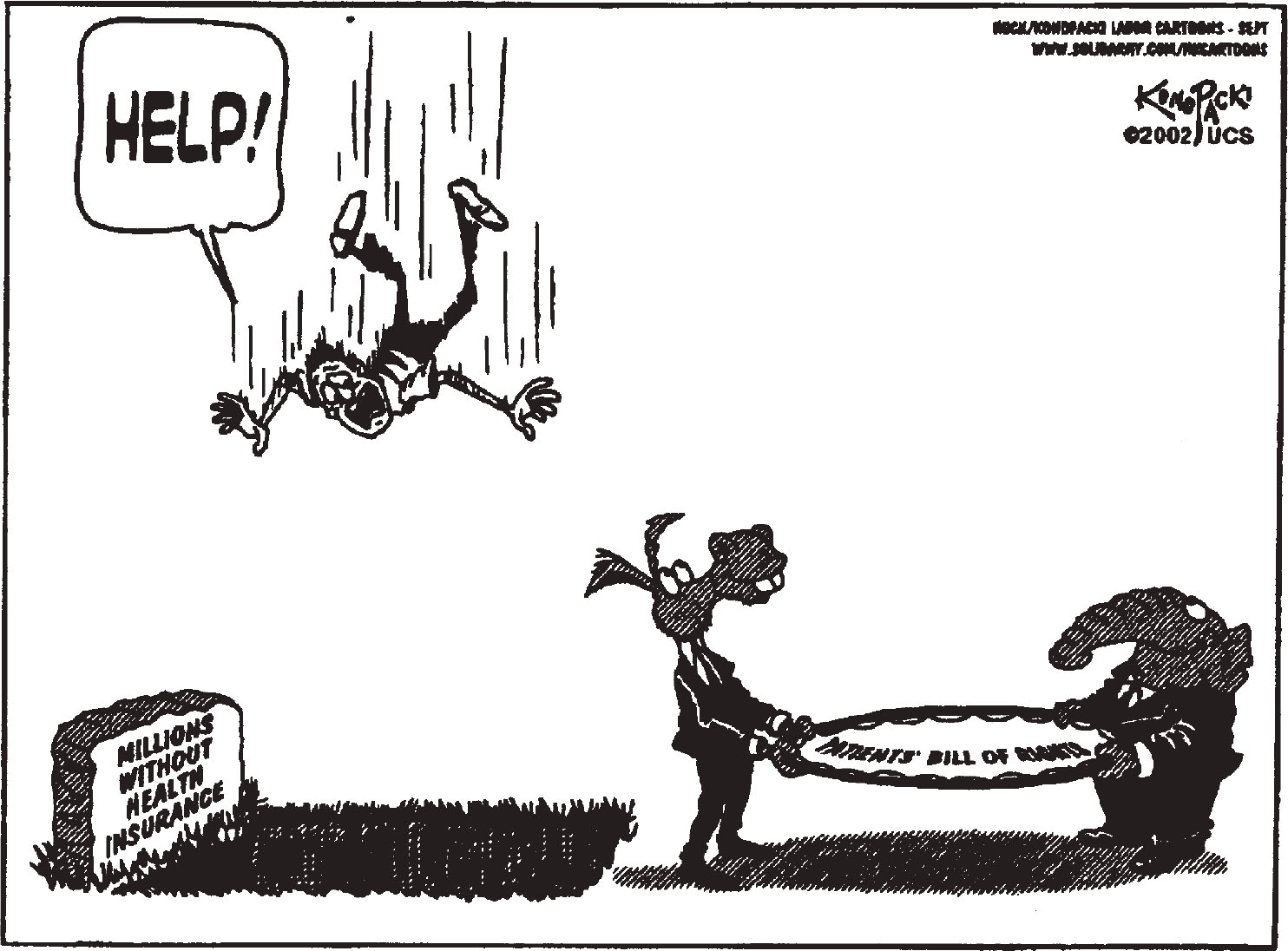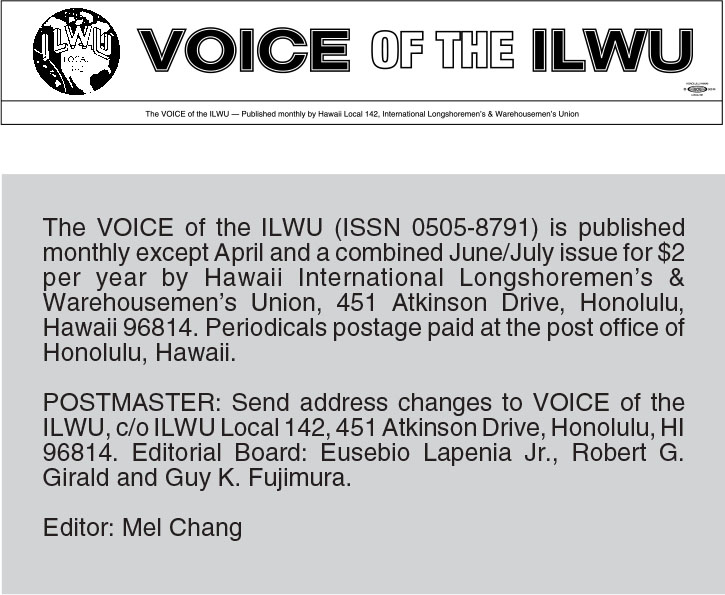Healthcare and Job security topped the list as the two most important public policy issues for ILWU members, according to a survey of 122 unit leaders who attended training classes this year. The “Member to Member Survey” asked people to list the biggest concerns facing working families.

The ILWU took on three issues dealing with healthcare costs in the 2002 Session of the Hawaii State Legislature—reducing the high cost of prescription drugs, especially for senior citizens; controlling healthcare cost by requiring insurance providers to justify rate increases; and protecting worker benefits under the existing prepaid health law.
The ILWU found strong support for these issues among the Democratic members of the Legislature.
The Republicans strongly opposed the ILWU on two of these issues— they voted against controlling healthcare costs and voted to reduce benefits to workers under the prepaid health law. Based on their principles, the Republicans should also have opposed the bill aimed at reducing the cost of prescription drugs for senior citizens because it calls for an expanded role of government. In their party platform, the Hawaii Republican Party states, “A truly competitive medical market place must be created because free market solutions are preferable to expanding the role of government.” However, most Republicans found it difficult to vote against such a popular cause. Five Republicans did cast the only “no” votes on this bill.
Following their principles, 20 out of 19 House Republicans and all 3 Senate Republicans voted against health insurance regulation. In contrast, almost every Democrat in the House and Senate voted in favor of health insurance regulation with only 3 voting against. The vote to protect worker benefits under the prepaid health law was also sharply divided along party lines. The issue was only considered by the State House of Representatives. Only 13 of the 19 House Republicans voted on the bill, but all 13 voted to weaken the benefit to workers. In contrast, 32 Democrats voted to protect workers benefits and three “Democrats” voted against the issue—one of whom later switched parties and became a Republican.
Role of Government
These positions taken by the Republicans are based on their belief that the economy works best when private profit and private business are free from government restrictions and regulations. Thus, Republicans seek to restrict and limit the role of government in the economy.
The Republican solution to the high cost of healthcare is to have more of the same. They want to encourage more private health plan providers to enter the Hawaii market. They suggest people need to set aside more money to pay for medical and propose tax deductions for medical savings accounts.
Collective Solutions
On the other hand, the ILWU takes the position that private enterprise created this healthcare crisis in the first place and the solution lies in the democratic, collective power of the people—acting through their government. This is a view shared by many Democrats.
Government is needed to provide needed services and to protect the community from private companies that are controlled by a handful of owners and stockholders who seek only to maximize profits for themselves. There are also many vital services that are best provided by our government. Do we want a society where police and fire protection are provided by private companies and only available to people who pay for these services?
Healthcare, in particular, is one area where government should play a more active role. The U.S. healthcare industry is already one of the most privatized in the world. Privately owned and controlled, for-profit companies dominate all parts of the system—they manufacture the drugs, they sell the insurance, and they deliver the care. These companies have long operated with minimal government regulation.
Today, we are seeing the results of a healthcare system run as a private, for-profit business. Healthcare in the US has become the most expensive in the world, where we pay more than double what any other country pays for healthcare and still rank an embarrassing #37 in overall performance.
The U.S. is the only industrial country that doesn’t have basic healthcare guaranteed to all its citizens. Americans have healthcare if they can afford it—and 41 million Americans have no healthcare coverage because they can’t afford it. The high cost of healthcare is driving many of our senior citizens into poverty as they are forced to pay more for their monthly medication than they pay for rent.
The bill passed by the Hawaii State Legislature to regulate health insurance rates is only a small step in the right direction.

Pay more for healthcare—continued from page 2
administrative cost and paperwork, compared to the U.S.
The United States did rank #1 in terms of responsiveness of its healthcare system. This was measured in terms of dignity, autonomy, confidentially, prompt attention, quality of amenities, access to support networks, and choice of care provider. Canada ranked #7, which is not bad, considering the cost of Canada’s system is less than half that of the U.S.
Higher taxes, too
The high cost of medical care in the U.S. impacts our society in many other ways
Our taxes are higher—healthcare costs account for a large portion of the tax burden as county, state, and federal governments spend more for the healthcare obligation of its workers, retirees, and Medicare and Medicaid programs.
Schools suffer—governments are forced to take tax dollars away from education and other programs to pay for rapidly increasing medical costs. The 50 states now spend $105 billion on various health insurance programs.
Our wages suffer—as medical costs increase, employers try to cut other areas, such as wages, pensions, and benefits. A small wage increase may be wiped out by paying a higher share of medical insurance premiums or higher out-of-pocket costs.
We pay more for auto and workers compensation insurance—healthcare costs accounts for a large part of the price of auto insurance and workers compensation insurance.
Our exports are put at a competitive disadvantage—the higher cost of health benefits for U.S. workers adds to the production cost of U.S. companies. It means a Canadian company paying the same wages and producing the same product as a U.S. company can sell its products on the international market for less than the U.S. company.
Our health suffers—because of high out-of-pocket costs, as many as 20 percent of people with medical plans are not filling prescriptions, are skipping medical treatments, or are waiting until a condition becomes serious before seeing a doctor.
No health insurance—one out of seven or an estimated 41 million Americans have no health insurance at all. Many work full-time, but because of the high cost of medical, their employers don’t provide health insurance.
The World Health Organization study shows us that many countries are able to provide excellent healthcare at much lower costs than the United States. Canada saves on administrative costs with the government buying health coverage from private providers. The French have their choice of private doctors and medical bills are paid by insurance funds, jointedly administered by employers and employee representatives and unions. In Sweden, health care is provided by government run hospitals and clinics.
In all of the countries that outscored the U.S., their governments plays a much more active role in providing healthcare as a right guaranteed to all its citizens.

